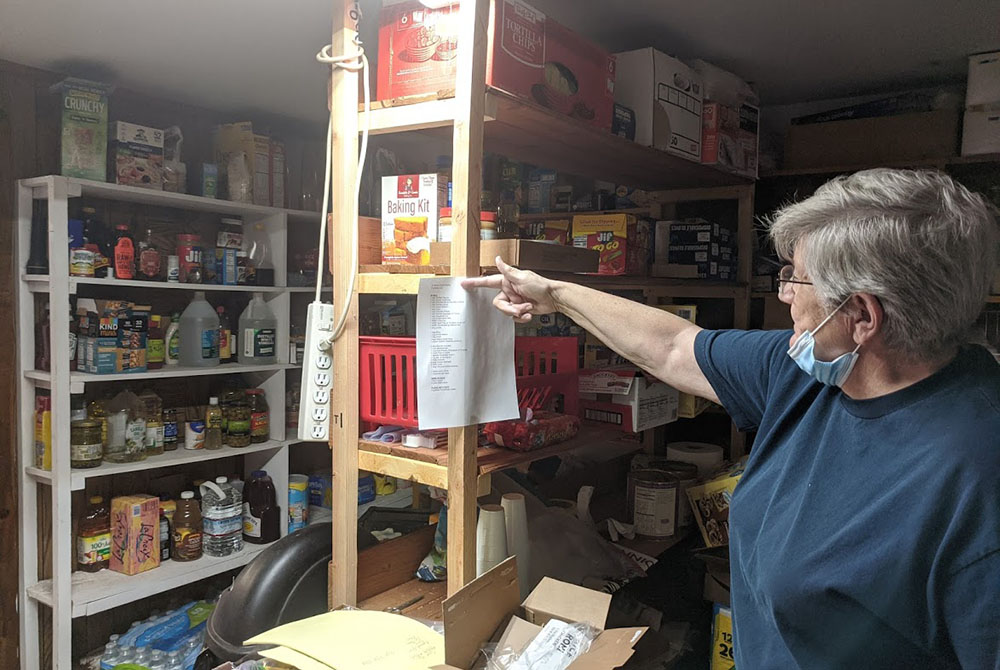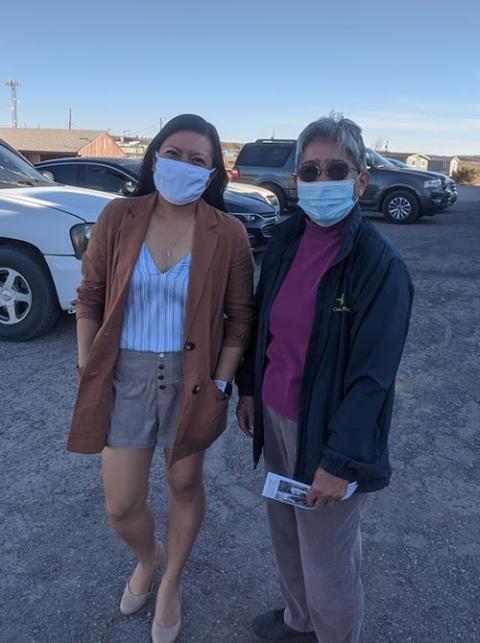
Dominican Sr. Monica Dubois ministers in the small town of Klagetoh, 55 miles south of Chinle, Arizona, with a population of about 200 people. She has provided emergency food and used clothing, and since the pandemic, now delivers drinking water, gives rides to homebound elderly to a grocery store, and talks to people on the phone. (Peter Tran)
With winter approaching amid the coronavirus pandemic, Srs. Maureen Farrar and Michelle Woodruff of the Adorers of the Blood of Christ managed to organize deliveries of some 20 truckloads of firewood to homebound sick, elderly, and disabled Navajo living near Crownpoint, New Mexico.
"We will not be able to supply them for the whole winter, but it's good to start with when it starts getting cold," Farrar said. The firewood project began in September when the two sisters received funding from the Catholic Extension, a Chicago-based nonprofit organization that assists faith communities in poor and remote areas across the United States. The project was suspended for a few weeks when Woodruff tested positive with COVID-19, and both sisters had to be quarantined until late September.

Sr. Michele Woodruff of the Adorers of the Blood of Christ helps deliver firewood to homebound sick, elderly and disabled Navajo people living near Crownpoint, New Mexico. She and Sr. Maureen Farrar, also a member of the Adorers of the Blood of Christ, organized the firewood drive as part of their outreach during the coronavirus pandemic with a grant from Sisters on the Frontlines. (Courtesy of Sr. Maureen Farrar)
Farrar, who professed her religious vows 65 years ago, said she cannot do the heavy lifting work anymore, but Woodruff and other volunteers helped with hauling and delivering them to more than 20 households as far as 40 miles on dirt roads. Deliveries were completed in October.
Catholic sisters, including Farrar and Woodruff, are finding creative ways to provide social and pastoral care to parishioners and other members of the Navajo Nation. Many of the sisters have ministered for years to the Navajo, but the pandemic is posing new challenges and opportunities. Since the pandemic began in March, sisters in their respective parishes and missions in the Navajo Nation have learned to use video services and social media such as Zoom and Facebook, and are increasing their outreach through phone calls, texts and emails to connect with homebound elderly, pray with parishioners, teach religious education, organize food pickups and deliver firewood and water in remote areas.
The Navajo Nation is a Native American Indigenous tribe with a population of 175,000 who live in a 27,000-square-mile area that covers parts of Utah, Arizona and New Mexico. It is the largest Indian reservation in the United States, and features wide-open sandy desert, washes, canyons, mountains, steep mesas and red buttes.
Curfews and weekend lockdowns have been in place for months to prevent the spreading of the coronavirus, and with cases rising again. A stay-at-home order was issued Nov. 16 and extended through Dec. 27 as Navajo Nation officials requested a disaster declaration from the federal government to get additional infrastructure and financial resources. The first reported coronavirus case in the Navajo Nation was in mid-March, and by May, it had the highest per capita coronavirus infection rate in the country. As of Dec. 3, the Navajo Nation recorded 17,310 cases of COVID-19 and 663 deaths.
The spread is exacerbated by underlying issues prevalent on the reservation, such as poverty, a lack of running water, limited access to quality health care, and a community way of life. Jonathan Nez, president of the Navajo Nation, described how it is difficult to practice social distancing, because many generations — parents, children and grandparents — live under one roof. When someone gets the virus, that person goes home and infects others in the family.
The lack of water prevents people from washing their hands, Nez said. According to a CNN report, at least 30% of the population has no access to running water. Nez also noted that the reservation has few gas stations, grocery and convenience stores, so when people run out of food or supplies, they all go to the same stores. The Navajo Nation in March issued health and safety measures and social distancing guidelines that include washing hands, wearing masks and limiting gatherings of people, along with curfews.

The Navajo Nation has enacted various measures to try to control the coronavirus pandemic, including daily curfews and weekend lockdowns. The first reported coronavirus case in the Navajo Nation was in mid-March, and by May, it had the highest per capita coronavirus infection rate in the country. As of Dec. 3, the Navajo Nation recorded 17,310 cases of COVID-19 and 663 deaths. (Peter Tran)
Woodruff, who is also a public health nurse at the Crownpoint Health Care Facility, says the pandemic really highlighted the health disparity that exists in the Indian country and other rural poor areas. The hospital was already short of staff and supplies, and the pandemic highlighted what was lacking. For instance, the hospital does not have an intensive care unit, she said, so patients with severe cases of COVID-19 had to be transferred to outside facilities. As a public health nurse, Woodruff said her job is to educate people on preventing the spread of disease, but harsh realities make following the recommendations difficult. "How could you wash your hands, when there is no water at home?" she asked.
Farrar and Woodruff have been using social media and texting to keep connected with parishioners at St. Paul Catholic Church in Crownpoint, and its Risen Savior Mission some 38 miles south. "It is difficult," since the pandemic began to maintain contact, Farrar said. "We talk to people. We use Facebook, telephone calls, messaging them, texting them. We put bulletins on Facebook. The challenge is that not everyone has Facebook or Internet." Farrar said they held a Zoom meeting in late October for the first time to reach out to parishioners from the church and the mission. About 10 people joined, sharing how life is like under the lockdown.
On the feast of All Saints, the parish priest also for the first time held the Mass through Zoom. About 10 people, including Farrar and Woodruff, participated from their homes. Standing next to the priest at his rectory, a guitarist started the opening song. Some parishioners sang in front of their computer or a cellphone. The Mass went smoothly even though they did not receive Communion, Farrar said. With the reality of having to shelter in place on weekends, the liturgy is now being held through Zoom on Sunday.
Serving the people of the Navajo Nation during the pandemic draws on the same approach she and another sister of her congregation adopted when they first came out to Crownpoint 38 years ago, Farrar said. "We just wanted to be with the people," she said. "We are here to do whatever it needs to be done to help make their lives better. We are here not to convert, or not to solve problems. We are here to love them, pray with them and for them, and be witnesses to the Gospel. This has become home." She and the then-parish priest discussed the greatest needs, resulting in the start of a used clothing store and a food pantry, which are still operating.
With the pandemic, Farrar said they have had to be creative in reaching people in need, which is how the idea of delivering wood came about. "We have done a lot of listening to the people," she said. "That's one of the greatest things as far as I am concerned, because you really connect with people," she added. "I think we have made an impact on the community. They don't need advice, but they need someone who cares."

Sr. Maureen Farrar is pictured at a used clothing store, one of the first endeavors she started when she arrived in Crownpoint, New Mexico, 38 years ago. The store, and a food pantry, also started then, are both still in operation. (Courtesy of Sr. Maureen Farrar)
With the grant from Sisters on the Frontlines of Catholic Extension, Farrar and Woodruff organized, purchased and delivered the wood, enlisting volunteers to help. Geneva Werito, a Navajo volunteer, helped distribute four truckloads of wood to 12 households, mostly to the elderly and the disabled. The firewood would last about three weeks, Werito said, speaking from her home in Prewitt, New Mexico.
Werito also spoke about how the coronavirus affected the Navajo, many of whom lost jobs in the cities and had to return to the reservation because they couldn't pay rent. "We are craft people," she said. "We are making pottery, kachina [doll figures], jewelry, and basket weaving. The income is not that good, but people are getting by."
Ella Thompson, a Navajo volunteer at the clothing store before the pandemic, said she missed working with the two sisters. She enjoyed helping the sisters because they give food and clothing to the Navajo regardless of their religion. When the pandemic began, she said people were told to stay at home. "We are OK, living one day at a time."
Advertisement
More than 35 sisters from 12 religious congregations are serving Native American communities of Acoma, Laguna, Zuni, Hopi and Navajo in the Gallup Diocese, according to the diocese's delegate for religious, Sr. Rene Backe of the Congregation of the Sisters of St. Agnes. Most sisters serve the Navajo, she said. "I admire their zeal and passion for their ministry. I found their lives inspiring. They are so involved in the Navajo's lives, being with them, caring for them. At this time of the pandemic, they are trying to minister to the people in any way they can. All of them are living out their founders' charism," Backe said.
Bishop James Wall, whose Gallup Diocese covers the Navajo Nation, also expressed his admiration and appreciation for the sisters. They are a "true blessing" to the diocese, he told GSR. "The people in the diocese have been blessed with the service of missionaries who bring the light of the Gospel to serve the poorest of the poor, especially during the pandemic."

Sr. Theresa Chato, right, with Madel Veridiano, teach religious education to about 20 elementary and high school students on Sundays via Zoom since the pandemic began. Chato, a Sister of the Blessed Sacrament and director of religious education of Our Lady of Fatima parish, credited Veridiano as instrumental in getting the online program going. (Peter Tran)
In Chinle, Arizona, about 150 miles west of Crownpoint, a Navajo sister is making an all-out effort to keep parishioners connected to parish life, using social media and video technology. Sr. Theresa Chato, a Sister of the Blessed Sacrament, and a volunteer teach some 20 elementary and high school children on Sundays via Zoom.
Chato, director of religious education of Our Lady of Fatima parish, credited volunteer Madel Veridiano, a Filipina immigrant who teaches in the Chinle Unified School District, for helping her with Zoom. "Although I miss the actual interaction and personal contact, we see each other in Zoom. The one advantage of using Zoom is the available video resources on almost any subject through YouTube for all the grades," Chato said.
"COVID-19 has really impacted our parish life," she added. The parish has three missions — in Lukachukai, Many Farms, and Pinon — remote areas about a 30-minute drive from Chinle. Since parishioners can't go to Mass, the parish arranges to have one "Sunday Mass," but celebrated on Friday at 5 p.m. because of the weekend curfew. The Mass is celebrated in the church's parking lot so people can practice social distancing.

Our Lady of Fatima parish holds Sunday Mass on Friday at 5 p.m. because of the weekend curfew. The Mass is celebrated in the church’s parking lot so people can practice social distancing. Some have driven more than 40 miles just to be able to worship with other parishioners, sitting in their cars facing the altar. (Peter Tran)
Some people have driven more than 40 miles just to be able to worship with other parishioners. They sit in their cars facing the altar. On this particular evening, the Mass drew some 15 cars. The Mass is also broadcast live on a local radio station.
For parishioners who could not come to Mass, Chato emails Sunday readings and reflections. For those without email, Chato texts links of Masses on TV. In addition, people can also call a Catholic parish in Fort Defiance, 75 miles away, for a Sunday reflection. "We give our parishioners the opportunity to have a sense of Sunday experience of praying together." Chato said she is committed to maintain contact with the parishioners. "If I cannot be with them, I will call, email or text them to see how they are doing," she said.
Chato, who also works at the parish's food bank, said she distributes food on the second and fourth Thursdays. People drive to the food pickup area where boxes are then loaded into the trunks of their vehicles.
In Tuba City, some 150 miles west of Chinle, the Daughters of Charity Sisters who are based in St. Jude Catholic Church continue their outreach ministry of social and food assistance by phone. Daughter of Charity Sr. Catherine France, spiritual advisor for the St. Vincent de Paul Society in Tuba City, said since March it's not been possible to carry out the St. Vincent de Paul Society's charism to help the poor by the usual custom of visiting them in their homes.

Clip from Jimmy Kimmel Live, March 21, 2019
"Instead of a home visit, we carry out a phone visit," she said. "People call me for prayers, or to pray with them on the phone. COVID-19 has changed how to do ministry. It has been a challenge, but it also proves what your ministry is." Although the pandemic is impeding people from personal interaction, worship and gathering together, she added, "you do not quit — you recreate. You serve the people anyhow. St. Vincent said 'love is inventive to infinity.' "
Their ministry of prayer is important for the Navajo facing challenges, she said. It is uncertain how long the effects are going to last, France said. "With the prolonging of the pandemic, people can be desperate due to the lack of money. There is a great deal of pandemic fatigue, people are having a hard time staying sheltered."
At another part at St. Jude Church's compound is St. Jude's Food Bank, which had to be closed in late March out of concern for the health of the Navajo, said Daughter of Charity Sr. Mary Peter Diaz.

St. Jude's Food Bank closed in late March because of the pandemic, but Daughter of Charity Sr. Mary Peter Diaz since August has partnered with First Things First, Arizona’s public funding source dedicated to provide funds for programs and services to address the development needs of infants through age 5, to prepare special food boxes for about 200 families. (Peter Tran)
She had to put out word to give away all the food before it shut down. "More than 180 families came for food boxes," she said.
Since August, Diaz has partnered with First Things First, Arizona's public funding source dedicated to providing funds for programs and services to address the development, education and health needs of children from birth to age 5. Her food bank prepares special food boxes. "We have about 200 families on the list. Once a month, they have to call us. We will have a box ready." Diaz added that in early November in collaboration with St. Mary's Food Bank in Phoenix, she provided food boxes that included fresh fruit, produce, milk and eggs to seniors.
Both First Things First and St. Mary's Food Bank gave Diaz the list of names of families and seniors to contact for the food. Asked how she would describe her ministry, Diaz paused for a moment and quoted St. Mathew's Gospel, " 'For I was hungry and you gave me something to eat.' " (Matthew 25:35).
Sal Brown Nez, a Navajo assistant at the St. Jude's Food Bank, whose job includes contacting families and seniors, said the pandemic has caused frustration and hardship for many Navajo. "They have no money to buy food." Many people who are not in the senior or First Things First programs have called to ask for emergency food. "We would give them food. We don't turn away anyone who comes for food."
For Dominican Sr. Monica Dubois, her ministry in a remote mission in the Navajo Nation is not different from populated areas like Tuba City, Chinle and Crownpoint. Like other sisters working in the Navajo Nation, she provides emergency food and used clothing. Now with the pandemic, she delivers drinking water, gives rides to homebound elderly to a grocery store, and talks to people on the phone. Located at St. Anne Mission in Klagetoh, 55 miles south of Chinle, with a population of about 200 people, Dubois said she understood that people don't have jobs during this time, so she gave food boxes to people with no questions asked.
People are trying to make ends meet with whatever services they can, like fixing cars, or houses, she said. Dubois, who has been in Klagetoh since 1998, fills each box with canned soup, beans, canned vegetables, peanut butter, jugs of water and masks. Baby food and diapers are also available.

Dominican Sr. Monica Dubois ministers in the small town of Klagetoh, 55 miles south of Chinle, Arizona, with a population of about 200 people. (Peter Tran)
She also opens a clothing store once a week for a few hours. She spends more time now listening to people on the phone, and trying to encourage them, she added.
Her ministry, she said, is reflected in Pope Francis' teaching (the apostolic exhortation Evangelii Gaudium, Chapter 3) on reaching out to people are who are not only Indigenous, but from a different culture, like the Navajo. She said she is not evangelizing by words, but by actions because "they are our brothers and sisters in need."
Betty Vanwinkle, a 64-year-old Navajo who is homebound, said she is grateful to Dubois because if she needs anything, she can count on the nun. Living alone in a remote area 8 miles from St. Anne Mission, Vanwinkle, who is diabetic with a heart problem, said when she needed to go shopping for groceries, Dubois would take her. If she needed drinking water, the sister would drop it off. Four of her five grown-up children live off the reservation, she said, and her oldest son who lives nearby cannot help her because he has health problems. "I am very grateful for Sr. Monica's help," Vanwinkle added.
The lack of financial resources has also affected parishes, such as Our Lady of Fatima, said Chato in Chinle. The church used to have income from bingo, and rental from the church hall. "We are trying to be wise in our spending," she said. In Chinle, she said the Indian Health Services, the Chinle Public School District and the Navajo Nation government agencies are the three main employers. There are no other major sources of income. "We are living a simple life here in Chinle," she said. "Looking to the future, we are not going back to the normal like in February and March. We are going to build a new normal whatever that is. Life is still going on here," she said. "It is full of hope."
[Peter Tran is assistant director of the Redemptorist Renewal Center in Tucson, Arizona.]










